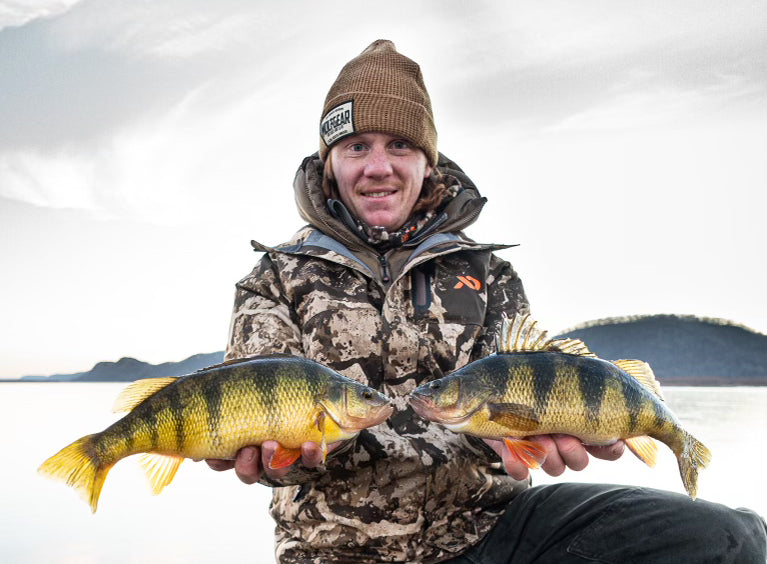First Ice
Hunting Jumbo's on the Mississippi River Backwaters
November 10, 2022


Despite his schedule, Rud says he has the flexibility to fish when he wants. “I’ll usually fish the first four hours in the morning or the last four hours in the evening. That’s when the best bites happen – unless there are serious pre-frontal conditions, then I’ll be out all day,” says Rud, adding that the fishing is usually well worth the time and effort. “We’ve got quantity and quality in our yellow perch here,” he says. “A 13.5-incher is a darn good one, but I’m ultimately after those 15’s.”
Rud employs a variety of presentations. He regularly uses devices like an iFish Pro 2.0 or a Finicky Fooler, which are essentially tip-up devices that allow Rud to fish up to the legal maximum number of lines. Unlike regular tip-ups, however, the Finicky Fooler and iFish Pro allow Rud to use his favorite St. Croix rods. “I can set a live rosy-red minnow near the bottom with either of these devices while I’m hole hopping and actively jigging with a red-glow or white-glow tungsten jig and a wax worm, a micro-spoon tipped with a rosy-red minnow head, or a small Rippin’ Rap… those are my three go-to presentations,” Rud says. “Ultimately, it's the fight I’m after, so the Finicky Fooler and iFish Pro give me the convenience of a tip-up, but with the ability fight the fish on a rod and reel.”
Rud says he covers all his bases with the new St. Croix Skandic Series of ice rods. “I had the opportunity to fish with these rods last season before they became available to other anglers and could tell as soon as I picked them up that they were special,” Rud says. “The green color with the orange strike-indicating tips (ultralight and light-power models only) look phenomenal. They’ve got a true, custom-rod appearance but it’s their feather-light feel and durability that really set them apart for me. The cork handles are incredibly resilient. I’m throwing rods in a bucket when packing light, so added durability is huge with me. Then there’s the guide train. I’m fishing 2-pound Sunline fluoro line, and the new Seaguide Delta TYG guides on Skandic rods handle these micro-lines better than anything I’ve ever used. I also like the versatile handles that allow me to tape a reel anywhere on the grip for optimal balance, and Skandic’s price point is incredible, too.”
Rud favors the 36” light power SKAS36L Skandic model for fishing micro tungsten jigs. “It’s got the ideal power and action, and the 36” length makes it a great hole-hopping rod because you can fish it standing up,” Rud offers. “It’s very sensitive and light in the hand. It feels and fishes like a custom rod without the custom price, and it also bends really well with plenty of backbone but forgiving enough for those jumbo perch headshakes on light line. In anything less than two or three feet of water, I’ll actually need to put the rod tip down through the hole to avoid breaking that light line on the side of the hole.”
Rud says he can confirm that the Skandic SKAS36L is also a phenomenal rod for deep-water crappies. “I had the chance to target suspended basin crappies last winter on some of our area lakes, and the tip on that rod (SKAS36L) was the only reason I caught fish,” he claims. “Crappies feed from below and often strike a jig or micro-spoon when it is falling or being lowered on a tight line. I could actually see the weight of the jig unload from the tip of this rod when a crappie would eat 25 feet below me, and those bites weren’t being detected with any of the other rods we had on hand.”
If the perch are more active, Rud switches to a micro-spoon and minnow head presented on a 28” medium-light power Skandic rod (SKAS28ML), a model he also uses with his iFish Pro and Finicky Fooler setups. And when they’re super active? “Perch will pound a Rippin’ Rap!” he says. “I just like being able to upsize my bait and get a panfish to react to it. There’s nothing better than when a big perch slams a Rippin’ Rap, then it’s hand-to-hand-combat in two feet of water. It’s the greatest.” Want to try it for yourself? Rud says the SKAS28ML is the rod to have in your hand.
In addition to making absolutely sure you’re on safe ice, Rud offers some additional advice to early-season perch anglers.
“I see a lot of anglers jigging a lot more aggressively than they need to,” he says. “Less is usually more, so slow down if you aren’t getting bit, and consider downsizing your line or your jig.”
With regard to location, Rud advises not swarming a spot just because you see other anglers there. “You can follow the crowd and usually catch some fish, but you’ll have a lot more fun and become a better angler if you learn to find them on your own,” he says. “Fish get bumped from spot to spot and perch always seem to be on the move anyway, so if you want to maximize the results of your efforts you really need to be willing to move and stay mobile. Use your electronics to find fish and keep your jigs in the bottom ¼ of the water column. If you don’t catch a fish in 10 or 15 minutes, it’s time to make a move.”

